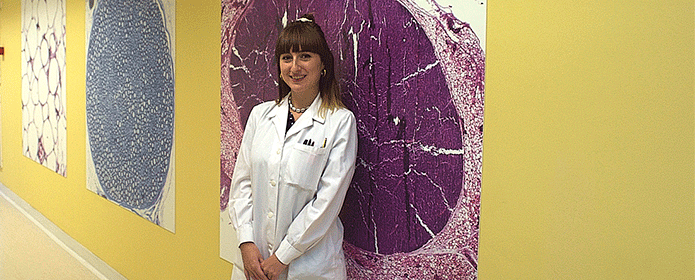"The beginning of my professional degree program has been in a diagnostic laboratory where I have reinforced my spirit of service".
Oihane Churruca, formerly an intern and now part of the CIMA LAB Diagnostics team, talks about her experience.

Microscopes, tubes from essay and white coats. These are perhaps the first images one thinks of when hearing or reading the word "laboratory". While it is true that these elements are indeed present, what is more important are the people who spend hours using them. Oihane Churruca, an intern at CIMA LAB Diagnostics for a year and now part of the team, knows this laboratory world well. As a child, Oihane watched the news and felt a special interest in those that were related to some new scientific cure or finding . When she graduated from high school diploma in Health Sciences, as many young people do, she was not sure which degree program career path to follow, but what she did know was that she wanted to help people with diseases.
Why did you decide to study biology?
At the end of the high school I did the Degree Superior of laboratory of Clinical Diagnostics, a decision that I will never regret, because it served me as motivation later to do the degree program of Biology at the University of Navarra. I started with a bit of fear, as I knew I would have to spend many hours at the university. The first year was the hardest. Biology is a degree program that covers many fields and there were subjects that I didn't like at all. As the years go by, you choose subjects that motivate you more, and you start to get used to university life.
Is there any subject that you remember with special fondness?
I remember a subject elective subject called "Keys to current thinking". In that class we had to talk about current issues. On the first day the professor asked us to talk about our life and what had brought us there. Then I remembered a sentence I read on the university website, just before starting the Degree. It was a kind of slogan that said: "University of Navarra, passion for life". Passion for life... That was exactly the reason why I was there. I have always had a passion for life and, to be honest, a fear of death, illness and suffering.
Why your orientation towards genetic diagnostics?
In the third year of degree program I chose a elective subject taught by Dr. María José Calasanz. She talked to us about genetic diagnosis techniques. I was fascinated by this subject. Not only because of the subject that was given, but also because of the way she gave class, the dedication and passion with which she spoke. That is when it became a little clearer to me that I wanted my professional degree program to be oriented towards genetic diagnosis. One day I met with Dr. Calasanz and María José Larrayoz, to whom I am very grateful, and I told them about my expectations for the future. I told them that I would love to work in something related to what they do. They gave me the opportunity to do the work End of Degree and summer internship at CIMA LAB Diagnostics. After finishing the internship, I started a scholarship PIE (postgraduate program de Iniciación a la business) that I managed through portal of employment of UNAV: Career Services.
In which area have you developed during the scholarship?
I was in the hematological genetic diagnosis unit, where a comprehensive genetic diagnosis is carried out for patients who present, mainly, leukemias or lymphomas. Tests based on conventional cytogenetic and molecular biology techniques are performed for the diagnosis and prognosis of hematological diseases.
What do you think is the most important part of work that you have done?
I think we are clear at all times that we are working with patient samples that are waiting for a result. I have learned to integrate the work flow of a diagnostic laboratory with a spirit of service and quality at work for the sake of the patients.
What would you highlight from what you have learned?
Both professionally and staff, this year has undoubtedly been the year in which I have learned the most. I have been able to have a first contact with the professional world contact and open doors for a future work. I know the techniques that are applied in a genetic diagnosis laboratory , and I have acquired knowledge of hematological diseases and genes related to these diseases.
How do you think you have contributed to CIMA LAB Diagnostics?
In my case, I believe that I have been able to contribute with my desire to work, enthusiasm, new ideas and effort in the daily tasks. My initiative and support in the different tasks has been valued. I feel that I have helped the other colleagues to take an important load off work . In the area of Molecular Biology there is a large number of work and little by little I have been incorporated into the routine of laboratory performing the different techniques. Currently I am meeting integrated in the daily activities as another staff technician.
How will you continue to contribute?
With new ideas, initiative, positive attitude at work and assuming responsibilities.
How would you sum up your experience in three words?
Effort, dedication and fellowship.
